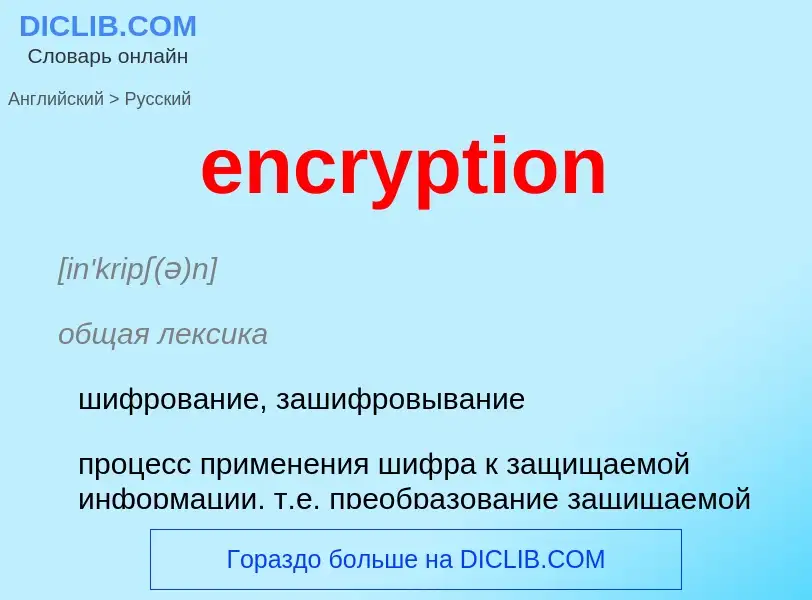Перевод и анализ слов искусственным интеллектом ChatGPT
На этой странице Вы можете получить подробный анализ слова или словосочетания, произведенный с помощью лучшей на сегодняшний день технологии искусственного интеллекта:
- как употребляется слово
- частота употребления
- используется оно чаще в устной или письменной речи
- варианты перевода слова
- примеры употребления (несколько фраз с переводом)
- этимология
encryption - перевод на русский
[in'kripʃ(ə)n]
общая лексика
шифрование, зашифровывание
процесс применения шифра к защищаемой информации, т.е. преобразование защищаемой информации (сообщения, файла, записи в БД и т.д.) в шифрованное сообщение с помощью определенных правил, содержащихся в шифре, чтобы её не смог прочесть пользователь, не имеющий ключа к данному шифру. Термины "шифрование" и "кодирование" по современным представлениям не являются синонимами
связь.
шифрование
шифровка
существительное
общая лексика
шифрование
зашифровывание
1) шифрование; зашифрование; операция (за) шифрования
2) криптография; криптографическая защита; криптографическое сокрытие информации
3) шифротекст
- encryption by random grids
- encryption for confidentiality
- encryption under DES
- additive stream encryption
- algebraic code encryption
- algorithmic encryption
- algorithm supported encryption
- analog encryption
- analogue voice encryption
- application encryption
- application level encryption
- asymmetric encryption
- audio encryption
- autokeyed encryption
- automatic encryption
- backward asymmetric encryption
- bidirectional asymmetric encryption
- bit-by-bit encryption
- bit stream encryption
- blob encryption
- block encryption
- block-by-block encryption
- block-chained encryption
- boot protection encryption
- broadcast encryption
- bulk encryption
- chaining mode encryption
- cipher feedback encryption
- codebook encryption
- combined encryption
- communication encryption
- compound encryption
- concatenated encryption
- connection-oriented encryption
- continuons encryption
- conventional encryption
- data-dependent encryption
- data link encryption
- DES encryption
- DES algorithm encryption
- digital encryption
- digital voice encryption
- direct encryption
- direct user to user encryption
- double encryption
- double key encryption
- dual-key encryption
- end-to-end encryption
- ETE encryption
- facsimile encryption
- field-mode encryption
- forward asymmetric encryption
- full frame encryption
- hardware encryption
- hardware assisted encryption
- hardware implemented encryption
- header encryption
- high-grade encryption
- high security encryption
- high speed encryption
- host-to-host encryption
- hybrid encryption
- improper encryption
- indirect encryption
- inferior encryption
- irreversible encryption
- key encryption
- keyed encryption
- letter-by-letter encryption
- link encryption
- link-by-link encryption
- long key encryption
- low-speed encryption
- manual encryption
- mathematically-based encryption
- mechanical encryption
- multialgorithm encryption
- multichannel encryption
- multidimensional encryption
- multilevel encryption
- multiple encryption
- multiple key encryption
- multiple stage encryption
- multiplex link encryption
- multiplexed encryption
- narrowband voice encryption
- node encryption
- node-by-node encryption
- NSA encryption
- offline encryption
- off-network encryption
- one-time key encryption
- one-time pad encryption
- one-way encryption
- one-word key encryption
- online encryption
- on-the-fly encryption
- packet encryption
- packet-mode encryption
- physical layer encryption
- plain codebook encryption
- point-of-sale encryption
- point-to-point encryption
- private key encryption
- probabilistic encryption
- product encryption
- proprietary encryption
- pseudorandom time division encryption
- public key encryption
- random encryption
- randomized encryption
- real-time encryption
- repeatable encryption
- repeated encryption
- repeatative encryption
- reversible encryption
- secret key encryption
- secure encryption
- selective encryption
- selective packet encryption
- serial encryption
- session level encryption
- single encryption
- single key encryption
- single-valued encryption
- software encryption
- software-based encryption
- source-to-destination encryption
- speech encryption
- step encryption
- stored encryption
- stream encryption
- substitution-permutation encryption
- symmetric encryption
- synchronous stream encryption
- terminal-to-host computer encryption
- text encryption
- text-dependent encryption
- time varying encryption
- total encryption
- traffic encryption
- traffic data encryption
- transparent encryption
- transport encryption
- transposition encryption
- treble encryption
- triple encryption
- two-key encryption
- two-key triple encryption
- user oriented encryption
- user-specific encryption
- user-to-user encryption
- video encryption
- Vigenere encryption
- voice-mail encryption
- wideband voice encryption
- white noise encryption
Википедия
In cryptography, encryption is the process of encoding information. This process converts the original representation of the information, known as plaintext, into an alternative form known as ciphertext. Ideally, only authorized parties can decipher a ciphertext back to plaintext and access the original information. Encryption does not itself prevent interference but denies the intelligible content to a would-be interceptor.
For technical reasons, an encryption scheme usually uses a pseudo-random encryption key generated by an algorithm. It is possible to decrypt the message without possessing the key but, for a well-designed encryption scheme, considerable computational resources and skills are required. An authorized recipient can easily decrypt the message with the key provided by the originator to recipients but not to unauthorized users.
Historically, various forms of encryption have been used to aid in cryptography. Early encryption techniques were often used in military messaging. Since then, new techniques have emerged and become commonplace in all areas of modern computing. Modern encryption schemes use the concepts of public-key and symmetric-key. Modern encryption techniques ensure security because modern computers are inefficient at cracking the encryption.

